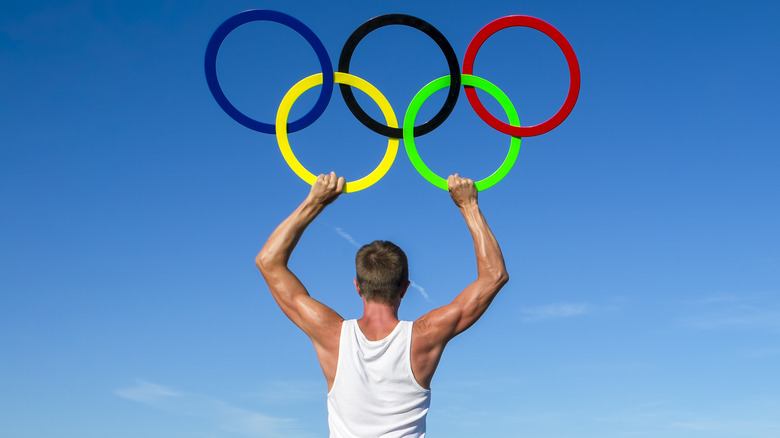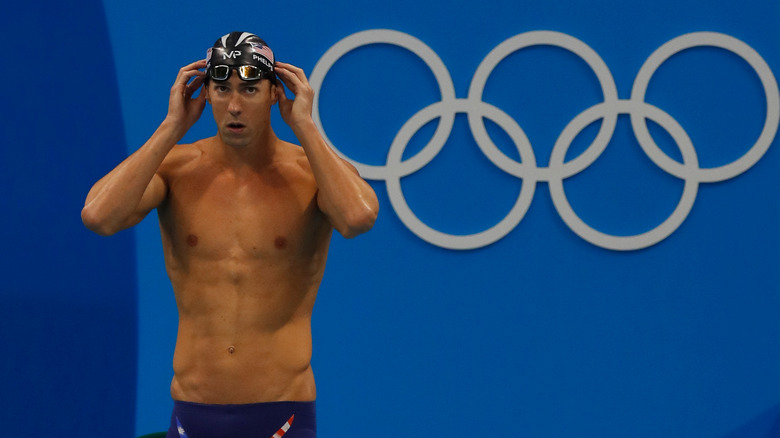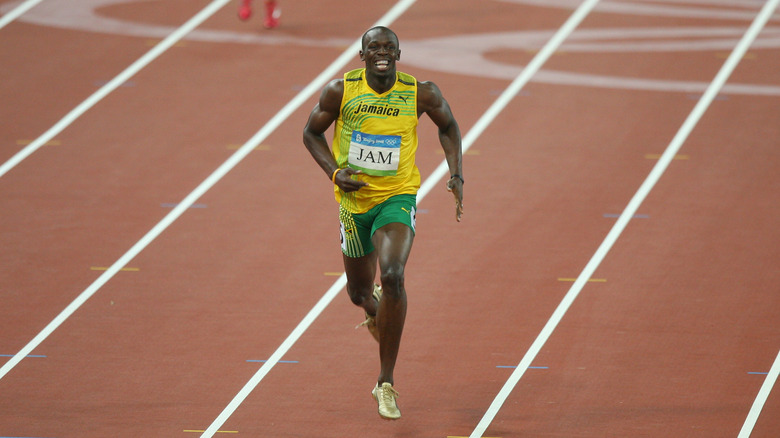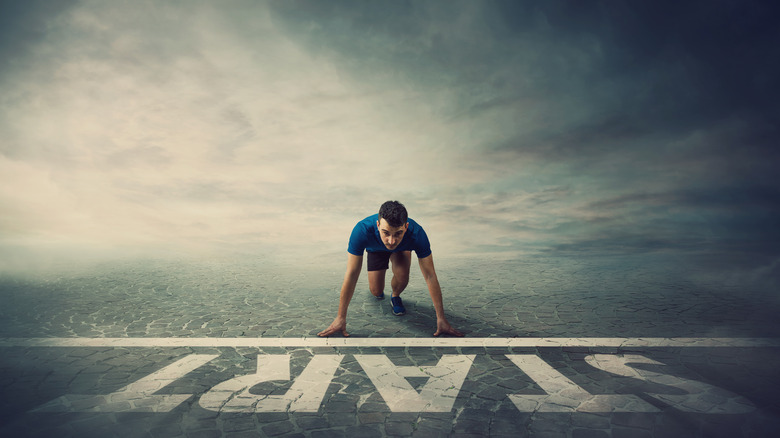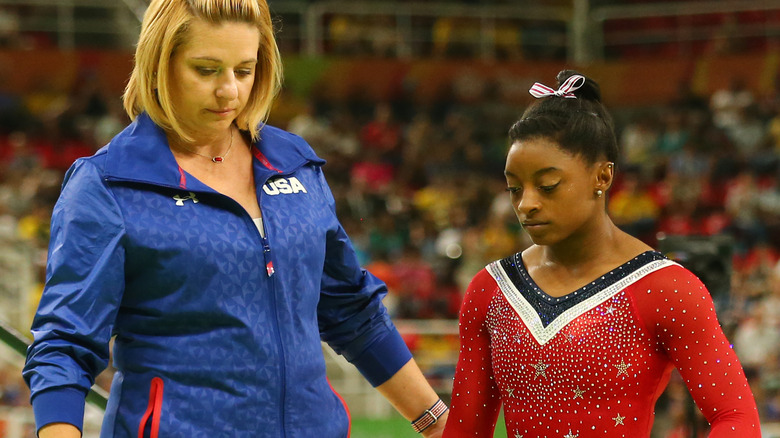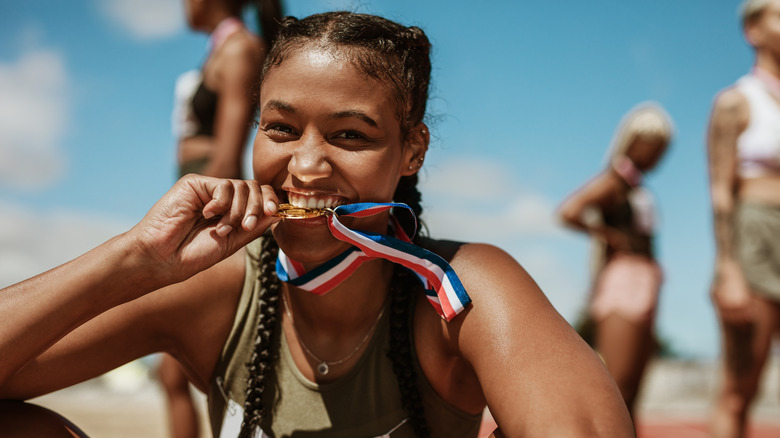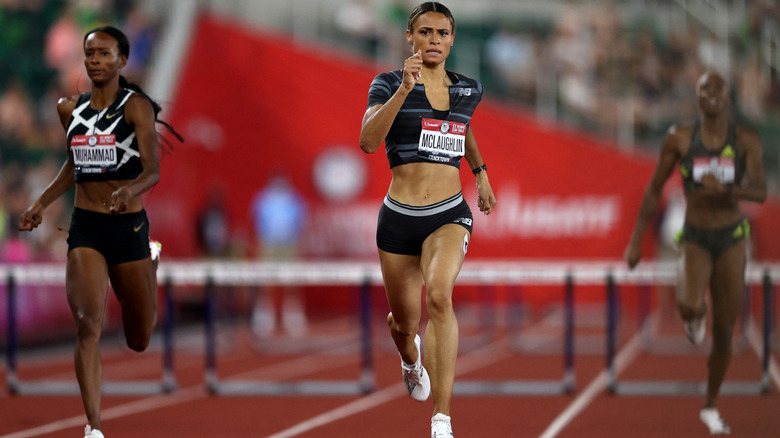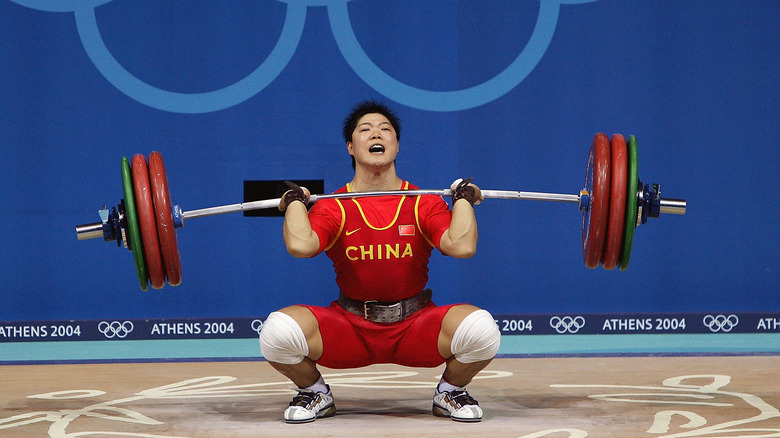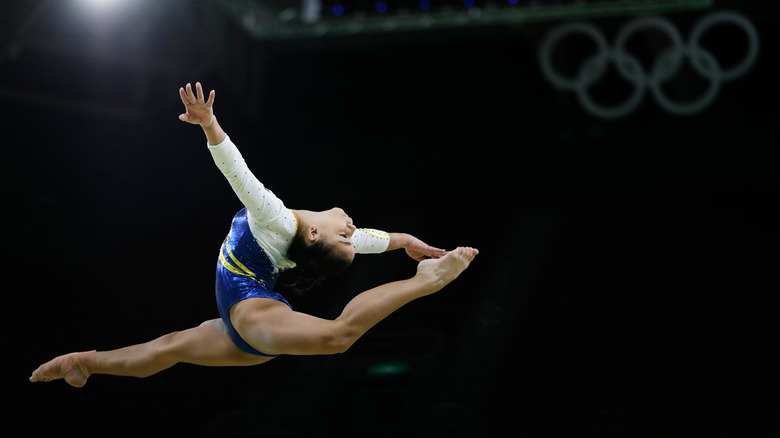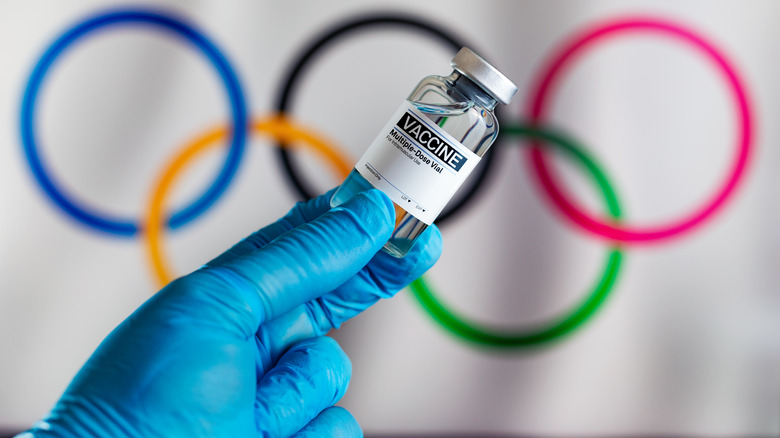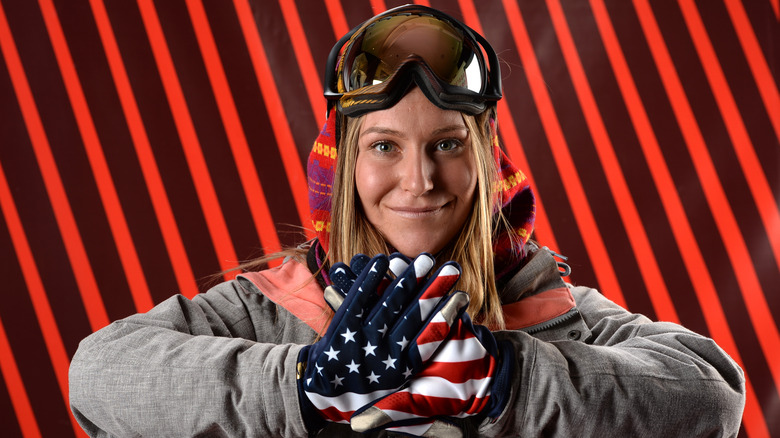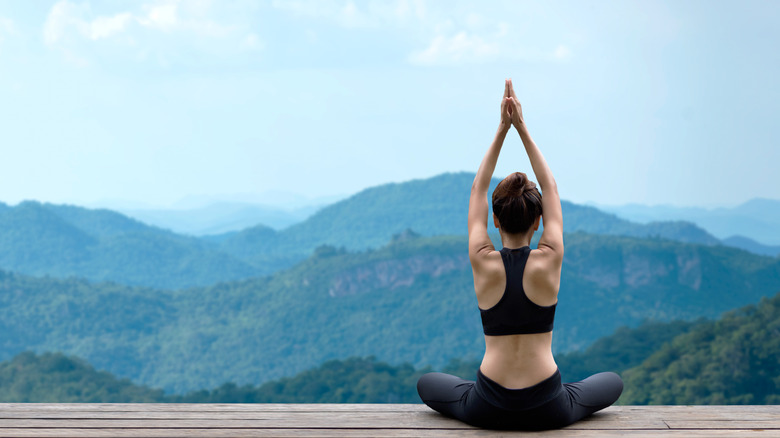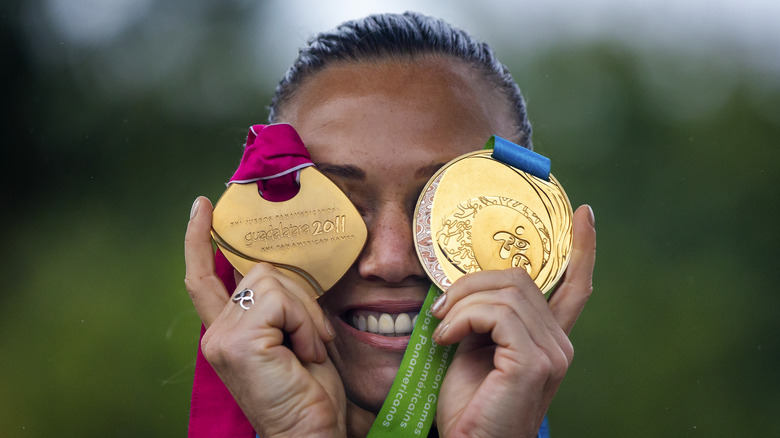What Happens To You When You're An Olympic Athlete
The Olympics are a magical coming together of countries to celebrate one of the oldest traditions of all time: sport. The Olympics began in ancient Greece to honor Zeus, the most important of the Greek gods. The first recorded games were held in 776 BC and consisted of only a single foot race, though the every-four-years tradition didn't come to be until 1896. Since then, only wars and a pandemic have prevented this time-honored and celebratory event from being held (International Olympic Committee).
In 2020, COVID-19 threw the world off course, with even the immaculately planned Summer Olympics in Tokyo put on hold. However, despite a year of training at home and under less-than-ideal circumstances, the athletes came back better than ever (Men's Journal).
We've always harbored secret Olympic dreams and lofty admiration for these out-of-this-world athletes. This prompts laypeople such as ourselves to ask what would happen to us if we became Olympic athletes? Let's take a look at what you could expect if you were to become an Olympian.
You'll change your diet
Michael Phelps famously proclaimed that he ate "three fried-egg sandwiches, three chocolate chip pancakes, a five-egg omelet, three sugar-coated slices of French toast, and a bowl of grits" for breakfast in the throes of training for the Olympics (via Healthcare). If you were to become an Olympic athlete, your caloric needs would drastically change due to increased activity levels too.
When surveying nutrition as a source of fuel, nutrition experts consider the macronutrients first: carbohydrates, fat, and protein. Simply put, carbs fuel your activities and many basic biological functions. Fat provides essential fatty acids and aids in the absorption of many fat-soluble vitamins and minerals. Protein helps with the overall recovery, building, and structure of muscles. All three macronutrients are essential to thrive, namely if you are chasing a gold medal.
Though the nitty-gritty details of nutrition are highly specified and sport and body-type dependent, most high-level athletes consume 55 to 60% of their daily calories from carbohydrates, 20 to 30% from fat, and 15 to 25% from protein (via Healthcare). Of course, everyone's body is different. Blanket statements about nutrition do not cover all of the bases. However, if you become an Olympian, you will need to dial in your diet to operate at your peak level of performance. The Joint claims that most Olympic athletes avoid alcohol, desserts, and more. That is a lot to give up, but some sacrifices lead to tremendous rewards.
You might start loving McDonald's
Loving McDonald's may seem like the opposite of healthful eating. We were surprised to learn how popular this specific fast food chain is among elite athletes. It seems wild, but hear us out. Olympians train for years to compete in events that only happen once every four years. While traveling, it is common to endure GI distress of varying degrees. A bout of diarrhea could derail an athlete's lifetime of training by causing them to be slightly off their game, dehydrated, or fatigued.
Many Olympians stick to familiar foods while on the road to prevent this catastrophe. And, well, McDonald's offers consistent options no matter where you are in the world. Additionally, according to Running Magazine, McDonald's has been a sponsor of the Olympic Games since 1976. Because of the sponsorship, McDonald's gets to set up shop in the Olympic Village and provide athletes with McNuggets and McOtherThings for free.
If you're anything like us, you love free food! If we became Olympians, you'd probably catch us going to town on some McDonald's nom. After all, Olympian Usain Bolt earned a reputation for eating McNuggets even before he competes. Running Magazine reported Bolt ate approximately 100 nuggies per day during the 2008 Olympics. Nutritionists would no doubt say McDonald's is not the best way to attain an Olympian's body or skills. Still, if you're on top, you might start loving McDonald's out of sheer convenience and comfort.
Training will become your second job
It should surprise no one that Olympic athletes dedicate their lives to training. Sometimes this training includes components meant to throw athletes off-kilter. Other times their coaches strive to create optimal environments for performance. This got us thinking: What would our lives look like if we swapped our weekend-warrior-esque marathon training for a strict, elite athlete-level regimen?
It is important to note that most Olympic-level athletes are virtually unknown before winning medals and often have to work "real" jobs to make ends meet. In addition to their workloads, athletes of this caliber train up to 20 to 30 hours per week (via Wild Friends). This makes our inability to commit to 6 a.m. CrossFit sessions seem especially foolish.
To squeeze in that many hours of intense training, the sport has to be your first priority. As we have already learned, Olympic success often comes at the expense of other extracurriculars in life. If you were to become an Olympic athlete, your days would take on a whole new level of intensity by way of around-the-clock training.
You'll have a coach to help you train
This is where the coaches come in. Coaches use their incredible expertise to create regimens for athletes. They consider timing, tapers, specialized skills, and numerous other elements when coaching athletes. If you were to become an Olympian, your coach would do the same for you! Coaches tend to view training as cyclical in nature, thus creating complexity around the programs they develop (via Polar).
Focused training ties in the specific movements of the sport in which the athlete competes. Predictably, the athletes spend a lot of their time practicing their sport-specific skills. But it doesn't end there. Olympic athletes need to excel in their sport, but coaches help guide the athletes to well-rounded fitness and health along the way. Sometimes this looks like taking a season off from training for recovery purposes because, well, burnout is real.
Even the Greek Gods among us need breaks sometimes. Breaks in training may seem unfocused, but there is a method behind this technique that keeps many athletes competing for the long haul. Focused training can incorporate elements such as core work, mobility, and even meditation (via Polar). All in all, if you were to become an Olympic athlete, you would definitely get a coach. And that coach would help you hone your skills, focus your strength, and harness your ambition.
You'll taper your training
Sans for a few of the hardest-core, most badass athletes, many sports enthusiasts look forward to the taper segment of their training. Tapering has been described as a time to dial back the physical efforts leading up to your big day. A poorly executed taper can aggressively hinder competition-day performance (via Active). Conversely, a properly-timed and organized taper can send you out feeling well-rested and ready to rock. Broadly speaking, the physiological adaptations start to degrade after two weeks of sloth life. Olympic coaches often use a percentage of perceived effort to calculate the proper amount to dial back.
Exercise physiologists do not totally agree on how much to pull back. Still, a solid grip of them recommends a 90% decrease in effort over the week leading up to a competition. The goal is to ensure that you are well-rested with strong, healed muscles before competing. Tapers, like many other elements of Olympian life, are sport-dependent. But as all coaches would no doubt agree, athletes should be as healthy and rested as possible heading into their big days (via Active).
Your body composition will change
It is no secret that an increased volume of training can yield epic physical results. While most Olympic athletes view aesthetics as a secondary priority, training at the Olympic level offers huge changes in body composition. According to eVitality, "Exercise maximizes muscle strength and agility, decreases fat percentage, and increases stamina." All of those components can influence the physical body directly or indirectly. On a basic level, those are the things you could expect to see when you start training to chase your Olympic dreams.
Behind the scenes, the physiology of your body pops off once you start training at this caliber. Your body will increase its ability to take in and utilize oxygen. This is known as Vo2 max, according to Healthline. This oxygen helps create adenosine triphosphate (ATP) on the cellular level, which is responsible for a series of reactions that ultimately gives your muscles the energy they need. With a higher cardio capacity and more efficient transportation throughout the body, you can expect your fitness levels to skyrocket as you continue to build muscle mass and decrease overall body fat.
You'll be grateful for your body type
BMI be damned! It is no secret that Olympians arrive to compete in a wide array of body shapes. Each and every one of them is in peak condition to execute their sport. From weightlifters to shot putters to gymnasts, each sport requires different abilities and thus different body shapes and sizes. It is important to note that, unfortunately, women's gymnastics a select few sports are still judged in part on their aesthetic appeal (via Vogue).
If you were to become an Olympic athlete, you would hopefully grow to love and respect your body type (not that you don't already!) for what it can do. After all, much of your body shape is inherited via genetics. The most notable inherited trait is height. However, your body composition and overall shape will begin to morph to adapt to the demands you impose upon it — be it weightlifting or running or swimming. Body fat and muscle mass are fluid components that can be altered and trained as time goes on (via Live Science).
You'll go to bed early
Honestly, being forced to go to bed early sounds like a dream. Rest and recovery are crucial elements in the fight to become a champion. Experts urge athletes to never underestimate the power of simply resting. According to Alaska Sleep, Olympians regard sleeping as a critical part of their training routine. It is just as valuable as the rigorous training schedule and structured diet. Because sleep is so important, elite athletes often create what can only be described as a bed-chamber.
If you were to become an Olympian, you would do the same. You would likely darken your bedroom, purchase the most comfortable bedding possible, and remove all blue lights from the vicinity. You would allow yourself time to wind down before bed, and you would prioritize a full eight hours of rest every night. You would maintain a quiet, cool space to encourage your body into dreamland. Additionally, you would ensure that you awoke at the same time every day. Then, with your circadian rhythm dialed in, you would be ready to greet the day and crush the competition.
Mark Rosekind, president of Alertness Solutions and former NASA scientist, told WebMD, "There are lab studies that show that if you're an eight-hour sleeper and you get six hours of sleep, that two-hour difference can impact your performance so that it equates to how you would perform if you had a 0.05 blood-alcohol level." This would obviously be a huge hindrance to an Olympian's performance.
You'll become aware of issues you may not have known about
The Olympics can have a dark underbelly that remains largely hidden. While the issues are vast, one of the bigger problems surrounding the Olympics is the Female Athlete Triad. If you were to become a female Olympian, this may be thrust onto your radar.
The Female Athlete Triad is the presence of disordered eating, amenorrhea, or osteoporosis (via Mayo Clinic). Amenorrhea is defined as the absence of one or more menstrual periods. Osteoporosis literally means "porous bone" and is brought on by a decrease in bone mass. Disordered eating sits on a spectrum between healthful, normal eating and full-fledged eating disorders. Sadly, it runs rampant among female athletes competing in sports in which aesthetics are scrutinized.
None of the three elements are standard physical responses to the demands of training but result from overtraining. Though they don't always exist in tandem, each component can give way to the next. A slight caloric restriction enacted can cascade into disordered eating. When coupled with excessive training, this can lead to frighteningly low body weights. Though it is still being studied, extremely low body fat percentages are often the cause of the loss of menstruation. Without typical menstruation, the body's delicate hormone balance gets thrown off, which can lead to the loss of bone density (via Mayo Clinic).
If you are struggling with an eating disorder, or know someone who is, help is available. Visit the National Eating Disorders Association website or contact NEDA's Live Helpline at 1-800-931-2237. You can also receive 24/7 Crisis Support via text (send NEDA to 741-741).
You'll get drug tested
Performance-enhancing drugs and blood doping, specifically, are widespread among Olympic athletes looking to get an edge. However, these things are considered cheating. The Court of Arbitration for Sport (CAS) enacts swift repercussions to any athletes found using chemical enhancements (Live Science). For example, 47 Russian athletes were found guilty of participating in a state-sponsored doping program before attempting to compete in the 2014 and 2018 winter games. As a reaction to this, the International Olympic Committee has expanded its list of illegal substances to over 200.
Athletes with their sights set on the Olympics get tested frequently over the months leading up to competitions. If something is amiss, they continue to get tested in rapid succession to produce a conclusive answer. It is rare, but occasionally medals will even be revoked once illicit drug use is uncovered. Perhaps the most famous example of this is Lance Armstrong's 2000 Tour de France scandal. His bronze medal was revoked 13 years later, shortly before he publicly admitted to doping (via BBC).
You'd better believe that if your athletic skills climb towards greatness, you'll be drug tested on the reg in order to keep the playing field even.
Your mental health may become a huge priority
Jamie Anderson, 14-time Olympic medalist, famously touts her love for yoga as a component of her success. In a 2015 interview with Yoga Journal, Anderson said that practicing yoga gives her a "ninja-like edge" and a healthy headspace.
According to OT and P Healthcare, mental health struggles affect about 35% of athletes at some point in their careers. The pressure of an impending competition and the expectation to medal is huge and, we assume, daunting. The Olympic committee has recently begun prioritizing mental health among athletes. This is thanks in part to Michael Phelps' openness about his struggles with depression and anxiety.
A healthy mental space goes hand in hand with excellent sleep, tight nutrition, and a rigorous training schedule. If you were to become an Olympic-level athlete, you would need to prioritize your mental health to stay on top of your A-game.
You might try meditation to focus
One of the keys to a secure mental space is often the presence of a meditation practice. If meditation conjures up images of monks chanting and sitting on the ground for hours, we assure you that's but one way to meditate. Mindfulness, or meditation, is the top way to build mental fortitude. Athletes with a consistent meditation practice report lower levels of anxiety, higher levels of focus and presence, and better performance overall (via Stack).
Meditation teaches your mind to rest. This is opposed to its default state, which the Buddhists call the "monkey mind" (per Psychology Today). When your mind is at rest, the niggles of the world around you start to disappear as you find presence. This present state or "flow" helps athletes stay in the moment as they compete. Even amid the chaos of competition, athletes can tune into the sensations that are alive in their bodies and push beyond their assumed physical capabilities.
Even without the lure of an Olympic medal, we are still down to try some mindfulness. With such glowing reviews, we can only assume that your Olympic aspirations will be best met with a side of meditation (via Stack).
You'll create small habits for overall success
Behind every Olympic athlete, there is a woman who — NOPE! Behind every Olympic athlete are years of training, a thirst for success, and tiny habits that add up over time. Many Olympians report that having small daily rituals helps to center and ground them for overall success (via The Atlantic). Even as motivation wanes, these stellar athletes get up every single day with a motivation to succeed. But, how we wonder, do they maintain this drive?
Many athletes attribute their success to their sleep. In fact, most athletes say that they prioritize sleep. By engaging in small rituals before bed (even the simple ones like brushing their teeth), they can drift off with ease and accomplish their goal of resting. Others, like Simone Biles, say it is really important for her to not take everything so seriously all of the time (via The New Yorker).
Some Olympic medalists say that they never skip breakfast (via The Daily Beast), while others prioritize a positive mindset (via Catalyst). Others still visualize success, while their competitors turn to certain songs to get in the groove. No matter what their rituals are, there is a certain solidity in having a pre-competition ritual. Like so many other things, if you are to become an Olympic athlete, small rituals could have super shiny, metallic payoffs — eureka!

